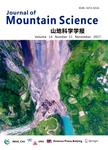Community attitudes toward ecotourism development and environmental conservation in nature reserve:a case of Fujian Wuyishan National Nature Reserve,China
Community attitudes toward ecotourism development and environmental conservation in nature reserve:a case of Fujian Wuyishan National Nature Reserve,China作者机构:Faculty of AgricultureUniversity of the RyukyusNishihara Town School of EconomicsFujian Normal University Kanazawa University
出 版 物:《Journal of Mountain Science》 (山地科学学报(英文))
年 卷 期:2017年第14卷第7期
页 面:1405-1418页
核心收录:
学科分类:083002[工学-环境工程] 02[经济学] 0202[经济学-应用经济学] 0830[工学-环境科学与工程(可授工学、理学、农学学位)] 07[理学] 08[工学] 020202[经济学-区域经济学] 0713[理学-生态学]
基 金:the University of the Ryukyus Foundation(Fiscal year of 2014) the United Graduate School of Agricultural Sciences,Kagoshima University(Fiscal year of 2015 and 2016) for their grant to support this research
主 题:Economic benefits Environmentalconservation Nature reserve Residents' attitude Tourism development Wuyishan National NatureReserve
摘 要:Using social exchange theory, this study investigated residents' attitudes toward the preliminary stage of tourism development in nature reserves in Wuyishan National Nature Reserve of China, and the socio-economic and negative effects of residents' attitude toward the tourist industry. Results of the questionnaire survey indicated that local people perceived they could benefit from the economic activities related to tourism, and were supportive of the conservation of natural resources and local culture, sustainable community development, and community participation in ecotourism planning and management. This study also revealed that the variables of age, gender, education level, household income, family size, non-farm work arrangements, and the distance to tourism attractions, have significant association with respondents' attitudes toward ecotourism development, or negative impacts of the tourist industry. Respondents who are male, or have a higher household income, are more supportive of tourism development inside the reserve. Younger and more highly educated community members are more likely to support learning more about natural and cultural resources and landscapes. Respondents who have a hieher household income, or live far fromthe village center, are more concerned about the negative environmental impacts of tourism development.



